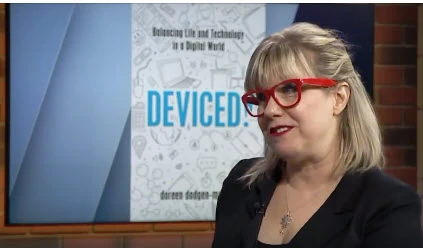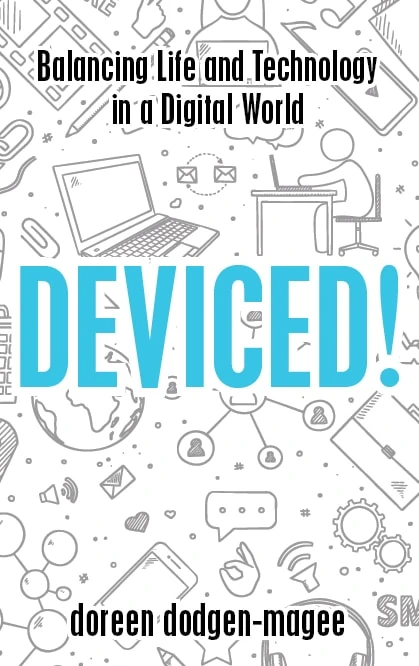How Families Can Moderate Their Technology Use
Doreen Dodgen-Magee, PsyD
80-Minute On-Demand Training
$35
Our online workshops provide you with access to experts in the field of health and wellness, distilling complex issues and topics into invaluable insights and advice you can use immediately

How Families Can Moderate Their Technology Use
What we give our attention to is what we value, and in most homes technology has become king of the mountain. Adults aged 35-49 watch an average of 33 hours of digital content each week. About half of teenagers say they are addicted to their mobile device, and young children are using electronics for about five of their waking hours each weekday.
As parents, we must actively make choices about technology for our children. We can’t let our kids’ classmates, the latest trends, or the surrounding culture dictate how much of our family’s attention ought to be devoted to apps, websites, and digital streaming.
Are you a parent who struggles with the following questions?
How much screen time is OK for our kids?
How do we assess the technology and apps our kids use and at what age?
How do we get our kids off their screens?
How do we moderate our own technology use!
Doreen Dodgen-Magee explores these questions and offers a realistic look at how we can better use technology and break away from the bad habits we’ve formed in this second of a three-part online workshop series.
Doreen’s personal stories, cutting-edge research, and anecdotes from youth, parents, and professionals have been featured in The New York Times, The Washington Post, and TIME Magazine. Dodgen-Magee reveals the brain changes that result from excessive technology use and offers an approach to the digital world that enables more informed use, lasting change and a healthier long-term perspective.

What we give our attention to is what we value, and in most homes technology has become king of the mountain. Adults aged 35-49 watch an average of 33 hours of television each week. About half of teenagers say they are addicted to their mobile device, and young children are using electronics for about five of their waking hours each weekday.
As parents, we must actively make choices about technology for our children. We can’t let our kids’ classmates, the latest trends, or the surrounding culture dictate how much of our family’s attention ought to be devoted to apps, websites, and digital streaming.
Are you a parent that struggles with the following questions?
How much screen time is OK for our kids?
How do we assess the technology and apps our kids use and at what age?
How do we get our kids off their screens?
How do we moderate our own technology use!
Doreen Dodgen-Magee explores these questions and offers a realistic look at how we can better use technology and break away from the bad habits we’ve formed in this second of a three-part online workshop series.
Doreen’s personal stories, cutting-edge research, and anecdotes from youth, parents, and professionals have been featured in The New York Times, The Washington Post, and TIME Magazine. Dodgen-Magee reveals the brain changes that result from excessive technology use and offers an approach to the digital world that enables more informed use, lasting change and a healthier long-term perspective.


Balancing Life & Technology in a Digital World
Given that we are living in a culture of ever-changing and advancing technologies, Doreen’s insights and advice will help us all weather the constantly shifting digital landscape by focusing on the concepts of honest assessment and healthy boundary setting rather focusing on specific technologies, digital shaming of our kids, or a “just say no” approach.
What’s Covered?
Parenting with Focus, Delay & Regulation
- Four key areas where technology impacts family life
- Building boredom tolerance & creativity
- Neurological pruning and behavioral norm setting
Establishing New Technology Norms
- Assessing technology use in the home
- Strategies for altering habits & reducing negative impacts
- The “technology pyramid” for assessing technology
Moderating Technology Use by Creating a “Fiery” Life
- Parents’ and children’s learning styles, temperaments & potentials
- Fixed vs growth mindsets
Takeaways
- New & engaging technology-free family activities
- Interventions, media choices & interpersonal skill development
- Reflections & discussion questions for parents and children
More than just focusing on the challenges, Doreen offers a mindful approach and practical tips in assessing current technology use, breaking bad habits, setting new norms, and re-engaging with life with renewed richness and awareness.

Tips, Tools & Answers to Common Questions
This 80-minute online training will provide you with tips and tools you can immediately implement in your personal and professional lives, including a handout with 36 technology interventions. The session also includes a Q&A where Doreen answers common questions from her presentations.
Get Doreen’s Book for 30% Off
As a special gift, you will receive 30% off of Doreen’s award-winning book, Deviced, when you register.
You Will Also Receive
- A recording of the workshop
- A workshop kit with summarized key points, tips and practices to try, and further resources
- A 30% discount on Doreen’s award-winning book, Deviced! Balancing Life and Technology in a Digital World

Meet Our Presenter

Doreen Dodgen-Magee, PsyD, is a psychologist, award-winning author, and speaker. Her first book Deviced! Balancing Life and Technology in a Digital Age recently won the Gold Nautilus Award for Psychology and her work has been featured inThe New York Times, The Washington Post, and TIME Magazine. She maintains an international speaking schedule, and is followed online via her blog and Instagram, where she posts challenges for living moderately with tech and wildly in embodied spaces.
One of Doreen’s primary passions is engaging people about how the new digital landscape is shaping humanity. Far from being technology phobic or averse, she inspires the consideration of potential new norms around device use and encourages people to become moderate, not abstinent, in their tech engagement.
For more information about Doreen visit:
DEVICED! Balancing Life and Technology in a Digital World
Doreen’s website
facebook
instagram
twitter
